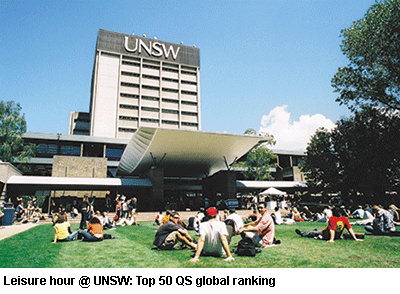University of New South Wales, Sydney
Widely acknowledged as one of the world’s premier teaching and research higher ed institutions, UNSW is ranked #45 worldwide and #3 in Australia in the QS World University Rankings
 Established in 1949, the University of New South Wales (UNSW) is widely acknowledged as one of the world’s premier teaching and research higher education institutions. In the QS World University Rankings 2017, UNSW is ranked #45 worldwide and #3 in Australia, with a five star-plus rating for teaching, research, employability, facilities and innovation. It is also a member of the prestigious Group of Eight, a coalition of Australia’s premier research intensive universities.
Established in 1949, the University of New South Wales (UNSW) is widely acknowledged as one of the world’s premier teaching and research higher education institutions. In the QS World University Rankings 2017, UNSW is ranked #45 worldwide and #3 in Australia, with a five star-plus rating for teaching, research, employability, facilities and innovation. It is also a member of the prestigious Group of Eight, a coalition of Australia’s premier research intensive universities.
Sited on a sprawling 93-acre campus in the suburb of Kensington in Sydney, this 69-year-old university offers a wide range of undergrad and postgraduate programmes in art and design, arts and social sciences, business, engineering, law, medicine, and sciences to 55,000 students from 128 countries, including 800 from India. “UNSW is a popular choice of Indian students because we offer high-quality industry-connected study programmes in an international learning environment to prepare students for the techno-innovations-driven economies of tomorrow. We are currently pioneering a new academic calendar UNSW3+ from 2019 under which three ten-week terms and an optional five-week summer term will allow students to tailor their learning experiences and take advantage of industry internships and work-integrated learning,” says Amit Dasgupta, India country director, UNSW.
Sydney. Situated on Australia’s east coast, Sydney (pop.5 million) is the administrative capital of New South Wales and the most populous city of the sixth continent. Also the economic and financial hub of Oz, Sydney is best known for its harbour, spanned by the unmistakable arch of its Harbour Bridge and the spectacular sails of the Sydney Opera House. Ranked the 9th best student city worldwide in the QS Best Student Cities Rankings 2018, Sydney offers a heady mix of theatres, museums, sports facilities, art galleries, beaches, cinemas, restaurants and business opportunities.
Sydney has a humid, subtropical climate with mild winters and warm summers. Temperatures range from a minimum of 8°C in July to a maximum of 26°C in January.
Campus facilities. UNSW’s main campus is located in Kensington, a suburb of Sydney, 20 minutes by bus from the central railway station. Rolling grounds, elegant buildings and extensive sports and recreational facilities distinguish this university’s $1.2 billion campus. The newly renovated Roundhouse is the hub of student life while the $123.5 million Tyree Energy Technologies Building is one of four education buildings in Australia to be awarded a 6-Green Star Design rating by the Green Building Council of Australia. Other campus landmarks include the 21,000 sq. metre Biomedical Precinct Extension, School of Mechanical and Manufacturing Engineering which hosts a 350-seat lecture theatre and Materials Science and Engineering building with elaborate workshops, display spaces and research areas. The university’s two libraries offer a vast collection of books, e-journals, e-books, and historical archives.
Inevitably, in sports-loving Oz, the university’s sports infrastructure is extensive and includes an aquatic and fitness centre, four tennis courts, two indoor cricket nets, three fields for rugby, football, baseball, and cricket, synthetic hockey turf and facilities for archery, athletics, badminton, baseball, softball, basketball, boxing and muay thai, cycling, judo, karate, kendo, lacrosse, netball, rowing, rugby, squash, table tennis, taekwondo, windsurfing, sailing, waterpolo, volleyball, waterskiing, wakeboarding, and underwater rugby.
The campus also hosts over 40 cafes and restaurants, two banks, a supermarket, and medical centre. Moreover, there are over 290 student clubs and societies which host a range of social and cultural events through the year.
The university’s other campus is located in Paddington, an inner suburb of Sydney, and hosts the arts and design faculty. It features cutting-edge galleries, private workspaces and open studios, research and digital labs, and student lounges. A third campus is located in Canberra at the Australian Defence Force Academy.
Admission. Admission applications for undergraduate study programmes should be submitted online (www.unsw.edu.au) together with a non-refundable application fee of A$100 (Rs.5,100). The minimum eligibility criteria are successful completion of Plus Two with English language proficiency. Cut-off marks for each study programme vary and can be accessed at http://www.international.unsw.edu.au/undergraduate-entry-table. For proof of English language proficiency, students need to submit IELTS (6.5 or 7)/TOEFL (90 or 577) or Pearson Test of English (64-plus) scores. For postgraduate programmes, the admission requirement is an undergraduate degree and English language proficiency. The admission deadline is May 31.
For further information, contact UNSW agents in India (AECC-Global in Bangalore, Ahmedabad, New Delhi, Vijayawada, Ludhiana, and Vadodara) or UNSW Sydney, NSW 2052, Australia. Ph: +61 2 9385 6996; e-mail [email protected]; website: www.unsw.edu.au.
Accommodation. UNSW is the largest provider of student housing in Sydney. Accommodation options include catered and self-catered housing/residential colleges with gender-specific options as well as independent apartments. A wide range of private rental properties and homestay options are also available to students. The university’s International Student Housing Assistance team helps students to rent private accommodation.
Degree programmes. UNSW’s nine faculties offer 143 undergraduate degrees and 296 postgrad degrees across its three campuses.
| SCHOLASTIC OPTIONS AT UNSW |
| he University of New South Wales offers a range of study programmes across its nine faculties. They include:
Art and Design. Fine arts, design, media arts, curating and cultural leadership, art history & theory Arts and Social Sciences. Arts and media, education, humanities and languages, social sciences Built Environment. Architecture, planning and construction Business School. Accounting, banking and finance, economics, information systems and technology, management, marketing, risk and actuarial studies, taxation and business law, Australian Graduate School of Management Engineering. Biomedical, chemical, civil and environmental engineering, computer science, mechanical and manufacturing, mining, petroleum engineering, photovoltaic and renewable energy engineering, electrical engineering and telecommunications Law. Business, commercial & corporate law, criminal law, dispute resolution, environmental law, human rights & social justice, intellectual property, international law, taxation Medicine. Medical sciences, psychiatry, public health and community medicine, women’s and children’s health Science. Aviation, biological, earth and environmental sciences, biotechnology and bio-molecular sciences, chemistry, materials science and engineering, mathematics and statistics, optometry, physics, psychology Tuition fees (per year): A$35,000-43,000 Living expenses: A$23,140 NB: A$= Rs.51 |
SRUTHY SUSAN ULLAS















Add comment